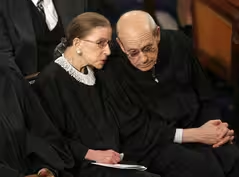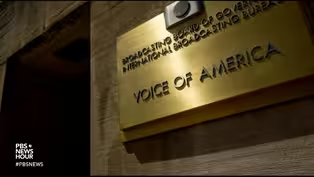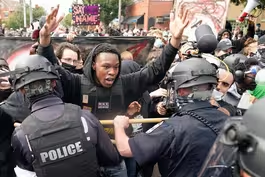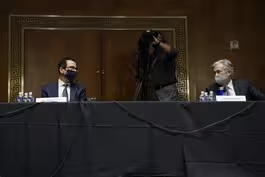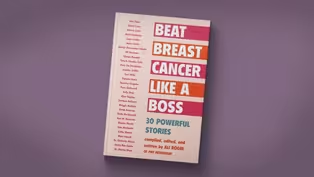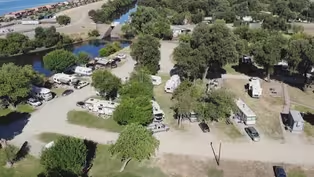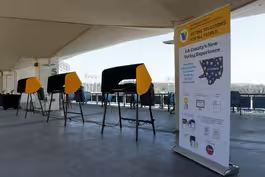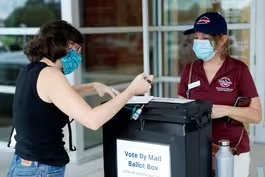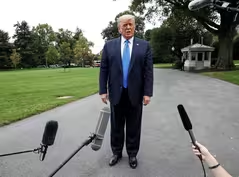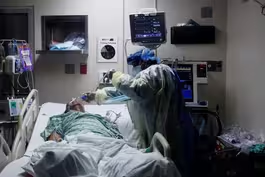
September 24, 2020 - PBS NewsHour full episode
9/25/2020 | 56m 50sVideo has Closed Captions
September 24, 2020 - PBS NewsHour full episode
September 24, 2020 - PBS NewsHour full episode
Problems playing video? | Closed Captioning Feedback
Problems playing video? | Closed Captioning Feedback
Major corporate funding for the PBS News Hour is provided by BDO, BNSF, Consumer Cellular, American Cruise Lines, and Raymond James. Funding for the PBS NewsHour Weekend is provided by...

September 24, 2020 - PBS NewsHour full episode
9/25/2020 | 56m 50sVideo has Closed Captions
September 24, 2020 - PBS NewsHour full episode
Problems playing video? | Closed Captioning Feedback
How to Watch PBS News Hour
PBS News Hour is available to stream on pbs.org and the free PBS App, available on iPhone, Apple TV, Android TV, Android smartphones, Amazon Fire TV, Amazon Fire Tablet, Roku, Samsung Smart TV, and Vizio.
Providing Support for PBS.org
Learn Moreabout PBS online sponsorshipJUDY WOODRUFF: Good evening.
I'm Judy Woodruff.
On the "NewsHour" tonight: The campaign intensifies.
Leading Republicans say there will be a peaceful transfer of will be a peaceful transfer of power, after the president refuses to say he would honor election results if he loses.
Then: In a night of largely peaceful protests, two officers are shot in Louisville, following the decision by prosecutors not to charge police for killing Breonna Taylor.
Plus: securing the vote.
We examine how Americans vote by mail, the extensive verification systems, and why voter fraud is a vanishingly small problem in the U.S. And hitting the road.
COVID-19 complicates the lives of an increasing number of older Americans traveling the country to find seasonal work.
JUDY ARNOLD, Workamper: There's a huge population of us that are still in limbo, wondering if there is a next job to go to.
JUDY WOODRUFF: All that and more on tonight's "PBS NewsHour."
(BREAK) JUDY WOODRUFF: The U.S. presidential race is focused tonight on a potentially critical question: Will President Trump accept the election results if he loses?
He won't say explicitly.
And that, in turn, has sparked criticism across the board.
Amna Nawaz has the day's developments.
JOSEPH BIDEN (D), Presidential Candidate: What country are we in?
AMNA NAWAZ: Democrats, including former Vice President Joe Biden, in disbelief.
JOSEPH BIDEN: Look, he says the most irrational things.
I -- I don't know what to say.
AMNA NAWAZ: After President Trump's latest remarks about the election, responding to this question in the Briefing Room yesterday: QUESTION: Do you commit to making sure that there's a peaceful transferal of power?
DONALD TRUMP, President of the United States: We want to have -- we have to have -- get rid of the ballots, and you will have a very - - we'll have a very peaceful -- there won't be a transfer, frankly.
There'll be a continuation.
The ballots are out of control.
You know it.
AMNA NAWAZ: Following Mr. Trump's failure to commit to the constitutional standard for every American election since the country's founding, the Senate passed a resolution committing to a peaceful transfer of power, and lawmakers, including House Speaker Nancy Pelosi, weighed in.
REP. NANCY PELOSI (D-CA): That a president of the United States would place in doubt the idea of peaceful transition of power is - - well, it's no surprise.
AMNA NAWAZ: A number of Republicans also spoke out to quiet concerns.
SEN. MIKE ROUNDS (R-SD): Every single Republican up here, I believe, is absolutely behind a peaceful transfer when -- when a sitting president loses.
REP. KEVIN MCCARTHY (R-CA): Let me put it all to rest for all of you.
It will be a smooth transition, no concern on the outcome.
AMNA NAWAZ: Other members of the president's party took to Twitter to respond.
Senate Majority Leader Mitch McConnell insisted, "There will be an orderly transition, just as there has been since 1792."
Florida Senator Marco Rubio pledged to peacefully swear in the president in 2021.
And Utah Senator Mitt Romney dismissed anything other than a peaceful transition as unthinkable and unacceptable.
Former Wisconsin Governor Scott walker, however, backed the president, tweeting: "Smart candidates never concede anything before an election.
They focus on what it takes to win."
It's not the first time President Trump has called into question whether he'd accept election results.
During a 2016 presidential debate, candidate Trump was asked this by FOX News' Chris Wallace: CHRIS WALLACE, Host, "FOX News Sunday": Do you make the same commitment that you will absolutely -- sir, that you will absolutely accept the result of this election?
DONALD TRUMP: I will look at it at the time.
I'm not looking at anything now.
I will look at it at the time.
AMNA NAWAZ: Wallace asked him again this summer.
CHRIS WALLACE: Can you give a direct answer you will accept the election?
DONALD TRUMP: I have to see.
Look, you -- I have to see.
No, I'm not going to just say yes.
I'm not going to say no, and I didn't last time either.
AMNA NAWAZ: As he left the White House this afternoon, the president doubled down on that message, returning to his unfounded doubt of mail-in ballots.
DONALD TRUMP: We want to make sure that the election is honest.
And I'm not sure that it can be.
I don't know that it can be with this whole situation, unsolicited ballots.
CROWD: Vote him out!
Vote him out!
AMNA NAWAZ: Earlier at the Supreme Court, the president drew strong public reaction while paying his respects to the late Justice Ruth Bader Ginsburg.
(BOOING) AMNA NAWAZ: The president has said he intends to announce his pick to replace Ginsburg this weekend.
For the "PBS NewsHour," I'm Amna Nawaz.
JUDY WOODRUFF: In the day's other news: Officials in Louisville, Kentucky appealed for calm over the Breonna Taylor killing.
There were new protests overnight, and two officers were shot and wounded after the decision not to charge police with Taylor's death.
Correspondent Yamiche Alcindor has our report.
YAMICHE ALCINDOR: Last night in Louisville, Kentucky, protesters' demands for justice for Breonna Taylor gained new urgency.
They came soon after a grand jury brought no charges against two officers who fatally shot Taylor in her home.
The officers were attempting to serve a drug warrant in March.
A third officer, who has already been fired, was indicted for recklessly shooting into a nearby apartment.
Taylor, who was sleeping before officers shot her, had no criminal record, and no drugs were found in her apartment.
Kentucky's attorney general said the officers who fired repeatedly acted in self-defense after Taylor's boyfriend fired a single shot.
Angry and distraught, hundreds took to the streets for protests across the nation, from Los Angeles to New York City... PROTESTER: It's definitely going to be in the history books.
If we do nothing, the police are going to continue to commit genocide on my brothers and sisters.
YAMICHE ALCINDOR: And Washington, D.C. CHRISTINE BRANDES, Protester: This young amazing woman who was contributing to her community gets shot down because they went to the wrong house looking for some ex-boyfriend?
The whole thing is so infuriating.
YAMICHE ALCINDOR: Demonstrations were largely peaceful, but, in Louisville, two police officers were shot.
MAN: Take cover!
Take cover!
WOMAN: Officer down.
YAMICHE ALCINDOR: Both are expected to recover.
One suspect has been charged.
It's unclear if he was a protester.
In Washington, President Trump commented on the violence as he left the White House.
DONALD TRUMP, President of the United States: I also think it's so sad, what's happening with everything about that case, including law enforcement, so many people suffering, so many people needlessly suffering.
But, with respect to Breonna, we give our regards to the family.
YAMICHE ALCINDOR: Today, in Louisville, more protests geared up.
GREG FISCHER, Mayor of Louisville, Kentucky: Our community is hurting.
Mayor Greg Fischer, who announced police reforms and a $12 million settlement with Taylor's family last week, said he understood the disappointment.
GREG FISCHER: The question, obviously, is, what do we do with this pain?
We never had control over what attorney general or the grand jury would do.
We do have control over happens next in our city.
YAMICHE ALCINDOR: A curfew in Louisville remains in effect for the next two nights.
For the "PBS NewsHour," I'm Yamiche Alcindor.
JUDY WOODRUFF: Another 870,000 Americans filed for unemployment benefits last week.
That was a slight increase from the previous week, but down from the peak of the pandemic.
Overall, unemployment remains at historically high levels.
Those jobless numbers came as Treasury secretary Steven Mnuchin talked up the recovery today.
At the same time, Democrats pressed the Trump administration to negotiate a new relief package.
They spoke at a Senate hearing.
STEVEN MNUCHIN, U.S. Treasury Secretary: America is in the midst of the fastest economic recovery from any crisis in U.S. history.
The August jobs report showed that the economy had gained back 10.6 million jobs, nearly 50 percent of the jobs lost due to the pandemic.
SEN. SHERROD BROWN (D-OH): I hope that you and the president don't dislocate your shoulders by patting yourself on the back, saying, good job.
I mean, I know you think the economy is doing well, but -- if you're talking to your wealthy friends on Wall Street.
But things are pretty bad for most working Americans, and are going to get worse, unless you come up with a real package.
JUDY WOODRUFF: In the House, Democrats now plan to offer a pared-down relief bill in a bid to jump-start negotiations.
President Trump's niece Mary Trump is accusing him and two of his siblings of cheating her out of millions of dollars.
She already published a tell-all book.
Now her lawsuit, filed in New York, claims fraud and conspiracy.
It alleges she was deprived of her share of family real estate holdings.
State prosecutors in Florida today dropped a misdemeanor sex charge against Robert Kraft, owner of the New England Patriots.
That came after courts blocked the use of video that allegedly showed Kraft paying for a sex act at a massage parlor.
On Wall Street, the Dow Jones industrial average gained 52 points to close at 26815.
The Nasdaq rose 39 points, and the S&P 500 added nine.
And, in Australia, wildlife crews have rescued 88 pilot whales so far, after the largest mass stranding ever recorded there.
Crews in Western Tasmania are working to move surviving animals back out to sea.
At least 380 whales have died, and their carcasses will have to be disposed of.
Still to come on the "NewsHour": we look at the ways Americans vote by mail and the extensive verification systems already in place; the Trump administration's response to the pandemic raises questions about the future of American health care; COVID-19 complicates the lives of many older Americans, who hit the road in search of seasonal work; plus, much more.
The president's outright refusal to commit to a peaceful transfer of power ties directly to his criticism and false statements about mail-in voting.
Mail-in ballots are expected to hit a record level in this election.
The president insists that they can't be trusted.
But many state officials say otherwise.
We're going to discuss President Trump's unprecedented statements shortly.
But, first, Miles O'Brien has a report on how mail-in voting really works and what past experience shows.
MILES O'BRIEN: It's August 14 in Ocala, Florida, four days until a primary election, and most of the ballots have been cast.
They roll in every day in bins from the post office, right past the office of Wesley Wilcox... WESLEY WILCOX, Marion County, Florida, Supervisor of Elections: What is today?
Good deal.
MILES O'BRIEN: Supervisor of elections for Marion County.
WESLEY WILCOX: If you would have asked me 10 years ago, if you would have asked me five years ago, or if you had asked me five minutes ago, am I a proponent of vote-by-mail, I am.
I like vote-by-mail.
MILES O'BRIEN: And so do most Floridians.
The state that became infamous for antiquated, ambiguous punch card voting during the disputed Bush-vs.-Gore presidential contest 20 years ago has fully embraced early voting and absentee ballots for anyone who asks, including Palm Beach resident Donald Trump... DONALD TRUMP, President of the United States: Thank you very much.
MILES O'BRIEN: ... who votes by mail, while repeatedly trashing the process, suggesting it is rigged and rife with fraud.
DONALD TRUMP: All these ballots come in.
These mailed ballots come in.
The mail ballots are corrupt, in my opinion.
And they collect them, and they get people to go in and sign them.
And then they -- they're forgeries, in many cases.
It's a horrible thing.
MILES O'BRIEN: The rhetoric is not supported by reality.
The conservative Heritage Foundation maintains an online database of documented election fraud cases in the United States.
It lists 204 cases of absentee ballot fraud, with 143 criminal convictions over the past 20 years.
On average, that's one case per state every seven years, representing about 0.00006 percent of total votes cast.
WESLEY WILCOX: A lot of the things that people talk about vote-by-mail just aren't reality.
You know, you can't run down to the Wawa or the Circle K and pick up a handful of vote-by-mail ballots.
It's just not there.
MILES O'BRIEN: Amber McReynolds is CEO of the National Vote at Home Institute and Coalition.
AMBER MCREYNOLDS, The National Vote at Home Institute and Coalition; The reason it's exceedingly rare is that there's multiple steps and checks in the system that prevent it and would identify it if it were to occur.
MILES O'BRIEN: McReynolds was director of elections in Denver when the state of Colorado left traditional Election Day polling behind in 2013.
In Colorado, every active registered voter gets a ballot in the mail automatically.
They can return ballots by mail, at drop boxes, and a few choose to vote in person.
Jocelyn Bucaro is Amber McReynolds' successor.
JOCELYN BUCARO, Denver, Colorado, Director of Elections: We only had about 1 percent of our voters in the state primary vote in-person.
So, that tells us that -- and we hope -- will be repeated in November, that voters will vote that ballot at home and use one of our secure methods to return it.
MILES O'BRIEN: Bucaro and her team showed me how they do it.
Ballot envelopes here are imprinted with an intelligent mail bar code, a number unique to each voter, which allows tracking through the mail.
The envelopes are run through a customized mail sorter that is connected to the registration database.
Drake Rambke is a project coordinator here.
DRAKE RAMBKE, Denver Elections Division: So, any time I run this machine, it's got the most up-to-date information.
So, if somebody voted in person an hour ago, and then we get their mail ballot that comes through, it's going to be kicked out as void, because they voted in person.
MILES O'BRIEN: So, it's real time?
Signatures are initially checked with software.
About 20 percent are automatically accepted that way.
The rest are verified, along with 2 percent of the machine choices, to double-check its performance.
DRAKE RAMBKE: We do extensive training, both internally, and then we bring in a handwriting expert that has worked with the FBI prior to every election to give more tips.
MILES O'BRIEN: The envelopes are opened by machines to maintain the secrecy of ballots.
Then they are fed into high-speed scanners to be tallied.
Voters are instructed to carefully fill in the ovals.
But, on some ballots, 1.6 percent in the last election, they don't fill them in completely or use X's, checks or other markings.
JOCELYN BUCARO: And in that case, the software will ask humans to take a look at that and say, is this a mark or not?
And we have bipartisan teams of election judges who do that ballot adjudication.
MILES O'BRIEN: Colorado is among six states that vote almost entirely by mail.
But the COVID-19 pandemic has prompted others to consider ways for people to vote without spending a lot of time in line with strangers.
AMBER MCREYNOLDS: I started getting a lot of calls.
Like, what would this look like?
Could we scale this nationally?
MILES O'BRIEN: She says yes, but not without difficulty.
The June 9 primary in Georgia was a case in point.
More than a million people voted by mail.
The previous record was 35,000.
This created chaos and confusion.
Many voters didn't get their ballots in time, and were uncertain that their votes were received and counted.
That prompted Waunda Hayes to try a belt-and-suspenders approach.
I met her waiting in a long line to vote in person.
Did you try to vote absentee?
WAUNDA HAYES, Georgia Voter: I sure did.
MILES O'BRIEN: What happened?
WAUNDA HAYES: Well, I received my ballot, and I sent it in, but I don't know if it was received or not.
MILES O'BRIEN: Oh.
So, you want to make sure?
WAUNDA HAYES: Yes, right.
MILES O'BRIEN: Secretary of State Brad Raffensperger says 1,000 Georgians double-voted in the June primary and August run-off.
The announcement gave some traction to President Trump's critique of mail-in voting, and his suggestion to supporters to try and vote twice.
But Raffensperger warned the public that what the president is encouraging people to do is a crime.
BRAD RAFFENSPERGER, Georgia Secretary of State: Double-voting is a felony that is a minimum of one year in prison, up to 10 years, up to a $100,000 fine.
And we will prosecute.
MILES O'BRIEN: Back in Florida, Wesley Wilcox's team is taking this unprecedented election year in stride.
They didn't break a sweat sorting, processing and scanning ballots in the August primary.
By Election Day, they only needed to push a button to tally the votes.
But, elsewhere, things are not running so smoothly.
In Tennessee, the law prevents election workers from even opening envelopes containing ballots until Election Day.
Several other states, including Michigan and Pennsylvania, have similar constraints.
Wilcox is hearing a lot from his counterparts in places where they are struggling to answer the mail.
This is an extraordinary election.
Are they all kind of freaking out?
WESLEY WILCOX: You know, the short answer, probably yes.
But there's the election administrator prayer: Lord, I don't care who wins as long, as they win big.
And that's a reality.
MILES O'BRIEN: The reality is, election night will likely be more like election week, while we all wait for the envelopes, please.
For the "PBS NewsHour," I'm Miles O'Brien in Ocala, Florida.
JUDY WOODRUFF: And now, to discuss the security of our election, and the president's failure to commit to a peaceful transfer of power, I'm joined by Kathleen Hall Jamieson.
She's the director of the University of Pennsylvania's Annenberg Public Policy Center.
Kathleen Hall Jamieson, welcome back to the "NewsHour."
Before we get to that, I do want to follow up on Miles O'Brien's reporting just now.
And, by the way, President Trump again denigrating mail-in balloting -- voting.
He called it a whole big scam today.
Tell us, in brief, what is your sense of the reliability of mail-in voting historically in this country?
KATHLEEN HALL JAMIESON, Director, Annenberg Public Policy Center: The academic evidence is clear.
The amount of problematic voting is so extraordinarily small that, barring an extraordinarily unusual circumstance, an election will not be so close that any of that could make any difference.
JUDY WOODRUFF: So, let's move on to talk about what President Trump has been saying the last few days, casting doubt, raising questions about whether he would accept the results of the election if he loses.
How would you sum up -- and he's been making these statements just in the last day or so.
But how would you sum up what he's said over the time of his entire presidency?
KATHLEEN HALL JAMIESON: The assumption that, if the president were to lose, it would mean that the election is rigged was an extremely problematic statement, as well as the statement in 2016 that suggested that he would wait to see whether or not he should concede.
But there is also another element that's problematic in his chain of statements across time.
And that's the statement that says: "In cases more political than it should be, and this is the outcome, it's important to have a ninth justice."
That assumes that we can't trust the independence of the judiciary, that the justices don't follow the Constitution and the law, that the four justices nominated by Republican presidents would side automatically, regardless of the law and the Constitution, with the Republican, and those dominated by a Democrat would automatically side with Joe Biden, and that the ninth justice nominated by the president presumably would automatically side with the president.
That calls into question another of the fundamental assumptions we make about our system of government.
It's checks and balances that are protected us across time.
It's the ingenuity of the founders that gave us three branches.
And those are the two branches that are there to protect us from executive overreach.
JUDY WOODRUFF: Have we ever before, Kathleen Hall Jamieson, heard a president connect the number of justices on the court in connection with whether or not his own reelection may be accepted and may have to end up in court?
Have we ever seen this kind of connection drawn by a president?
KATHLEEN HALL JAMIESON: No, we have not.
And because it was the Supreme Court that guided us through the 2000 outcome, which, as you know, was an extraordinarily close outcome, we have in our history the ability to say to nations across the world, when it was extraordinarily close, our three branches of government worked.
Our constitutional checks and balances structure and our willingness to grant the independence of the judiciary made it possible for the country to accept the outcome.
But never did anyone call into play the assumption -- bring up the possibility that there would not be a peaceful transfer of power.
Al Gore, who had actually called to congratulate then the assumed president-elect Bush, withdrew that concession, waited through the process, and, as soon as the outcome was decided clearly by the Supreme Court, he acknowledged that in a concession speech, and we had the peaceful transition.
And we could say to the world, under that problematic, difficult circumstance, an extremely close election, decided over a difficult period of time, our system worked.
The nations across the world are looking to us now and, I assume, wondering if all these years, when we have said free and fair elections, persons' votes actually count, and peaceful transfer of power, if Vladimir Putin isn't just laughing, saying, this is a propaganda coup for Russia, all the statements it's made across time saying, the U.S. actually isn't founded on any of that.
JUDY WOODRUFF: And I know that's something you have done a lot of reporting on.
But, just finally, why does it matter?
I mean, what is the harm done if the president himself is the one who is saying, well, I'm not sure I'm going to accept the results, we have to see what happens?
Why does that matter?
KATHLEEN HALL JAMIESON: We need to have confidence that the process of campaigning and the process then of voting as a result, and observing the campaign, and calling on your experiences, your partisan dispositions, and casting a vote is going to yield an outcome that is determined by we, the people, and by our electoral system, including the Electoral College structure.
And to the extent that someone suggests there's something else at play, that is, the ability of a president potentially to decide whether the election is free and fair, whether it's been rigged or not, calls into question the suppositions of our system of government.
That is deeply problematic.
JUDY WOODRUFF: And we should point out that a number of Republicans, even those who typically are right there at the side of the president, were today saying, as far as they're concerned, there will be a peaceful transfer.
Kathleen Hall Jamieson, thank you so much.
KATHLEEN HALL JAMIESON: You're welcome.
JUDY WOODRUFF: With just 40 days until Election Day, health care is becoming a bigger issue in the campaign.
That is due in part to the death of Supreme Court Justice Ginsburg and the possibility that the fate of the federal health care law could be argued before the Supreme Court just one week after the election.
Today, President Trump tried to broaden his appeal on his health care record.
William Brangham checks the rhetoric against the record.
WILLIAM BRANGHAM: Judy, President Trump today signed what he calls two key executive orders.
One of them pledges to end what's known as surprise medical billing, which can leave patients with huge unexpected debts.
The second says the U.S. will make sure that insurers don't discriminate against people with preexisting conditions.
But these orders don't change any laws.
Congress has to do that.
And all of this comes as the president is trying to repeal the Affordable Care Act, which already protects preexisting conditions.
For more on all of this, I am joined by Paige Winfield Cunningham.
she covers health care for The Washington Post Paige Winfield Cunningham, very good to have you here.
So, today's event was billed as the America First health care plan, but this wasn't really a plan, per se, the long-promised plan from the president.
This was the signing of two executive orders.
As I mentioned, one deals with preexisting conditions.
I think we have about a quarter of all Americans have what would be considered a preexisting condition.
What is this order?
And does it help protect them?
PAIGE WINFIELD CUNNINGHAM, The Washington Post: Right.
Well, this is really clearly an effort by Trump six weeks before the election to try to look like he is on sort of the winning side of this issue.
But there's a lot of dispute over whether he can even legally use the executive authority, use an executive order to extend these protections, and almost certainly this would be challenged in court.
A lot of people are questioning this already.
And of course, the Affordable Care Act, passed in 2010, pioneered this, was the first -- was legislation that extended these protections to Americans.
And the administration has refused to defend that law, and the case will be heard by the Supreme Court, of course, on November 10.
And it's really been remarkable, I would say, last year and this year, especially, as you have seen President Trump and Republicans try to completely rewrite the record on who has been in favor of these protections.
It plays really, really well with voters, and Democrats have successfully leveraged it against Republicans in the 2018 elections.
And so there's this very blatant attempt by Trump to make it look as he has sort of been a champion of this all along, even though, behind the scenes, he's done a lot of things to actually undermine those very protections.
WILLIAM BRANGHAM: So, if the Supreme Court were to do away with the Affordable Care Act, and Congress, as this executive order orders them to do to try to address this issue, if that does not happen, theoretically, a quarter of Americans could face some kind of discrimination with regards to their coverage?
PAIGE WINFIELD CUNNINGHAM: Right.
So, what would happen if we saw these protections fall -- and I should add, we aren't certain of that.
There's a lot of different scenarios that could play out.
And there's actually a very simple fix Congress could do to all of this to make this lawsuit go away.
But, if they were toppled, this would kind of go back to the lay of the land before the ACA was passed, before 2010, where it was up to states to regulate this.
And you really saw a variety of approaches.
Some of the more liberal states, say, California and other states, run by Democrats -- tended to more be run by Democrats, would put restrictions on what insurers could discriminate based on.
Other states had very few restrictions.
You saw Arizona was an example of essentially insurers could discriminate against essentially anything.
And not only that, but they could refuse -- if they knew that someone had had a particular condition in the past, they could refuse to cover treatment in the future that was in any way related to that condition that someone had had.
So, it was really the Wild Wild West in the individual market for these folks.
WILLIAM BRANGHAM: So, let's turn quickly, in the last half-minute we have before we have to go.
The second executive order addresses surprise medical billing.
Again, is there -- are there teeth this executive order?
Will this actually solve this very serious problem?
PAIGE WINFIELD CUNNINGHAM: This is an extremely tricky legislative problem.
You saw Congress really struggling through the nitty-gritty details of exactly how to do this.
All of last year, we had different legislation in the House and the Senate, different opinions about how to tackle this.
It's very complex.
The only thing this executive order does is, it basically instructs Congress to keep working on the issue.
And then, if they don't produce legislation by January 1, that HHS should then try to figure out how they could tackle this administratively.
But, again, it is a very complex issue.
This is why Congress hasn't yet been able to unify around a single bill.
And so Trump just coming out today and claiming that he's solved surprise medical billing is extremely far from the truth and a very misleading thing to tell the American people.
WILLIAM BRANGHAM: All right, Paige Winfield Cunningham of The Washington Post, thank you very much.
PAIGE WINFIELD CUNNINGHAM: Thank you.
JUDY WOODRUFF: The pandemic has spurred a surge in camping and R.V.
travel, as social distancing has become one of the catchphrases of COVID-19.
But it's not all fun and vacations.
One group of Americans has long since adopted a self-sufficient lifestyle, living full-time in motor homes and working seasonal jobs to support themselves.
Our economics correspondent, Paul Solman, has the story.
It's part of our Making Sense series Unfinished Business.
And a note: Some of this story was shot before the pandemic began.
DARLA MCLAIN, Workamper: This is the couch that turns into a bed.
PAUL SOLMAN: To Darla McLain, 64, and husband Bill, also 64, a former biker and hell-raiser, this is home sweet home.
BILL MCLAIN, Workamper: Our whole bedroom is done all in Levi's.
These are all my old pants.
PAUL SOLMAN: The McLains have been living in an R.V.
since 2010, after the Great Recession sank their L.A. motorcycle repair shop and their home.
BILL MCLAIN: We had a $700,000 house that we owed about $200,000 on that sold for $131,000.
DARLA MCLAIN: On the auction block.
PAUL SOLMAN: Broke, the McLains sold what was left and hit the road.
DARLA MCLAIN: It was that or rent an apartment and get jobs locally.
But there were no jobs.
PAUL SOLMAN: So, they drove to where the work was.
BILL MCLAIN: Our first job was Amazon in Coffeyville, Kansas.
PAUL SOLMAN: A two-month stint in the warehouse, holiday rush.
DARLA MCLAIN: It was pretty rough.
They expect certain numbers, and you have to hustle.
PAUL SOLMAN: Bill over-hustled.
DARLA MCLAIN: He blew his knee out.
BILL MCLAIN: I don't normally walk at 60 miles an hour pushing a heavy cart going around 90-degree turns.
PAUL SOLMAN: Amazon was the first of some 20 seasonal gigs.
When we first met them last fall, the McLains were parked across from a Las Vegas Ikea to peddle pumpkins and then Christmas trees.
BILL MCLAIN: With us, we have what we call wheel estate.
We just we just take the covers off, lift the levelers, fire it up, and we go where the economy is good.
PAUL SOLMAN: Tens of thousands of retirement-age Americans are migrant laborers, or workampers, driven by economic necessity and wanderlust.
This is Judy Arnold's fourth year workamping.
She's been tending a store in Yellowstone National Park since June.
JUDY ARNOLD, Workamper: It wasn't very busy at first, but, as time went on, it got busier and busier, until we have more people now than we have had in regular seasons.
People are just tired of being cooped up at home, and they thought, let's go to the parks.
PAUL SOLMAN: More sightseers, drawn away from COVID and back to nature, means a lot more work for a workamper like Arnold.
JUDY ARNOLD: I'm doing the work of three people right now.
PAUL SOLMAN: The pandemic has driven an awful lot of Americans onto the road, but the number of mobile-living, gig-hopping workampers has been growing for years.
Every January, hordes convene in Quartzsite, Arizona, the site of an annual R.V.
show.
That's where we met 66-year-old Susan Otteros.
SUSAN OTTEROS, Workamper: You end up in these really neat places, like Yosemite.
PAUL SOLMAN: Otteros works as a camp host.
Main tasks?
Checking in campers and, if you're up for it, cleaning.
SUSAN OTTEROS: I don't do the bathrooms.
(LAUGHTER) SUSAN OTTEROS: My boyfriend does the bathrooms.
I collect the money.
(LAUGHTER) PAUL SOLMAN: Mitch Craighead drafts camp hosts for Thousand Trails campsites.
How many 75-year-olds do you recruit?
MITCH CRAIGHEAD, Thousand Trails Campgrounds: More than you would expect.
Baby boomers are retiring.
The pool of workers that we're hiring for is growing dramatically.
PAUL SOLMAN: That was in January.
The company declined to give us specifics, but Mitchell says campgrounds are busier than these days.
MITCH CRAIGHEAD: We have always looked at ourselves in the camping industry as the original social distancing.
And a lot of our new customers are telling us just that.
We have seen a significant spike in reservations for the remainder of the camping year this year.
PAUL SOLMAN: At the R.V.
show, workamping veterans Rick and Tammie Wommack moved into their motor home nine years ago, after their son died by suicide.
TAMMIE WOMMACK, Workamper: We started out with what we call our Journey for Joshua, which was to honor our son.
But the reality after that three years was, it's expensive to live on the road.
You need new tires.
Maintenance costs are high.
PAUL SOLMAN: And big campers get just seven miles a gallon.
So, for the past seven years, they have worked the North Dakota sugar beet harvest.
TAMMIE WOMMACK: I didn't even know what a sugar beet was.
I thought sugar came from sugarcane, because where I come from, it does, you know, Dixie Crystal.
But, instead, 55 percent of our sugar comes from sugar beets, instead of sugarcane, in the country.
PAUL SOLMAN: Muddy 12-hour shifts at $14 an hour, plus overtime, until the beets run out.
Some nomad gigs pay a lot more than that.
Ms. J. transports R.V.s from manufacturer to dealer, and sees the country.
MS. J., Workamper: I can pick the jobs I want to take to go see various destinations.
So, if there's an R.V.
that needs to go to Florida, which I have done this, delivered in Miami, I went on over to Key West PAUL SOLMAN: And how much do you get paid for that?
MS. J.: I would say somewhere between $60,000 and $75,000.
PAUL SOLMAN: That's $60,000 to $75,000 a year, driving four days a week.
These days, R.V.s are selling like hot cakes, but Ms. J. is sitting out the pandemic in a tiny house in Georgia until next year.
MS. J.: The cases are up, especially for certain communities, communities of color.
And I'm -- I know quite a few of people who have been affected.
And so I just kind of choose to lay low until things kind of simmer down a little bit.
PAUL SOLMAN: Can you afford to?
MS. J.: I can.
I have been doing this pattern over a number of years, where I was able to financially prepare myself for the what-ifs.
And this is one of those what-ifs.
PAUL SOLMAN: Back in January, in the big tent, there were hawkers of tire pressure monitors, R.V.
window-cleaners, orthotics.
We reconnected with Bill and Darla McLain, who'd driven here from Mexico, where they go for affordable health care.
BILL MCLAIN: Shrimp tacos are killer.
(LAUGHTER) BILL MCLAIN: We have a great pharmacist down there.
We get glasses and our teeth worked on.
I don't know why -- how they can charge so much for stuff here that you can go right down there and get the same thing for a fraction of the price.
PAUL SOLMAN: But the McLains were at the R.V.
show for a gig, to sign up other workampers as oil field gate guards.
BILL MCLAIN: You have to man the gate 24 hours a day.
They pay $150 a day for that.
PAUL SOLMAN: Now, look, workamping obviously isn't for everyone.
Does this interest you?
MAN: No, not at all.
PAUL SOLMAN: And why is that?
MAN: Because I retired for a reason.
I don't want to go back to work.
PAUL SOLMAN: But Bill and Sandy Collins liked what they heard.
They workamp, helping fund their wanderings.
SANDY COLLINS, Workamper: We work Adventureland.
Then we go to J.C. Penney and then... PAUL SOLMAN: Doing what?
SANDY COLLINS: Working in the warehouse at J.C. Penney's.
PAUL SOLMAN: Even in bankruptcy, J.C. Penney's warehouse is still running.
And as, at Amazon, you have to step lively.
BILL COLLINS, Workamper: On Thursday, I walked 23,355 steps.
PAUL SOLMAN: According to 72-year-old Bill's smartphone, that is.
BILL COLLINS: And as long as I keep doing it, then I think my health is going to stay a lot better than I would if I sat down.
PAUL SOLMAN: That's one of the appeals of workamping to George Stoutenburgh.
GEORGE STOUTENBURGH, Workamper: I can't see myself stopping work.
I can't do nothing.
What is nothing?
You sit around and, what, wait to die?
That's not me.
PAUL SOLMAN: But he also needs the money.
GEORGE STOUTENBURGH, It's not like we're broke, but we're certainly not millionaires.
We can't afford to just travel the world and do whatever we want to do.
That would be a wonderful thing, but it's not my life.
PAUL SOLMAN: Judy Arnold's current Yellowstone gig has kept her more than busy, but, when it ends in October, she isn't sure what she will do.
JUDY ARNOLD: There's a huge population of us that are still in limbo, wondering if there is a next job to go to.
And a lot of my co-workers, where they normally go, the places aren't open.
So, I'm definitely worried, because I definitely need an income.
PAUL SOLMAN: As for Bill and Darla McLain, they have been parked outside their daughter's house in Arkansas for several months, making repairs to the R.V.
BILL MCLAIN: I think, for the most part, we have been surviving and trying to get through this, like most people are.
It is a little weird for R.V.ers.
I know that for a fact.
It's not the easiest thing in the world to find a place.
DARLA MCLAIN: It's not really that we can't travel.
It's just once you get where you're going... BILL MCLAIN: Where do you stay?
PAUL SOLMAN: But, this weekend, they're getting back on the road, headed to a new job, working and hoping to find places to camp.
For the "PBS NewsHour," this is Paul Solman.
JUDY WOODRUFF: Today, in the House Foreign Affairs Committee hearing room, there was an empty chair for Michael Pack, the CEO of the U.S. Agency for Global Media.
Pack ignored a subpoena from lawmakers, who today expressed bipartisan concern that he has politicized and mismanaged media outlets that helped the U.S. win the Cold War, including Voice of America.
Nick Schifrin begins our report with another action by Pack, foreign VOA journalists being forced to leave the U.S. NICK SCHIFRIN: Valdya Baraputri's career at Voice of America ended with a one-way ticket.
She didn't want to leave the U.S., but she and fellow VOA Indonesia journalist Rafki Hidayat had to take a plane home after VOA wouldn't extend their visas.
VALDYA BARAPUTRI, Former Reporter, Voice of America: Being thrown out of a country in the middle of a pandemic feels very cruel.
DONALD TRUMP, President of the United States: If you heard what's coming out of the Voice of America, it's disgusting.
NICK SCHIFRIN: President Trump has made it clear he's unhappy with what he calls VOA bias, as has the new CEO of VOA's parent company, the United States Agency for Global Media, or USAGM, Michael Pack.
MICHAEL PACK, CEO, U.S. Agency for Global Media: Ronald Reagan apparently said that, if you let go of the wheel of the car, it veers left.
And there's something to that.
The media, undirected, goes left.
It has a left-wing, leftward bias.
NICK SCHIFRIN: In audio interviews, Pack also cites national security.
He says the foreign journalists on U.S. visas weren't properly vetted, leaving the organization vulnerable to espionage.
MICHAEL PACK: Journalism -- to be a journalist is a great cover for a spy.
It's just a great cover.
And from the beginning, from the Cold War and even earlier, they have been penetrated.
JAMIE FLY, Former President, Radio Free Europe/Radio Liberty: These are the same slurs that are hurled at them by the Kremlin.
NICK SCHIFRIN: Jamie Fly Led Radio Free Europe/Radio Liberty, which is funded by USAGM, before he was fired by Pack.
JAMIE FLY: It was incredibly dangerous for the USAGM head to start basically writing a press release that the Kremlin can then turn around and use the next week about USAGM journalists.
NICK SCHIFRIN: "PBS NewsHour" spoke to a half-dozen of the more than 70 VOA journalists whose visas weren't renewed.
None would go on the record, but one provided this document, confirmation they filled out a standard U.S. government background check used for many administration officials.
It's more than 100 pages' long.
GRANT TURNER, Former CFO, U.S. Agency for Global Media: Mr.
Pack is making it seem like national security is at risk here.
NICK SCHIFRIN: Grant Turner was the c.f.o.
Of USAGM until he was fired by Pack.
GRANT TURNER: I think it's really just sort of pretext and a good cover for taking some abhorrent actions.
ANNOUNCER: The courier, a ship without guns, goes into battle with the greatest weapon of all: truth.
NICK SCHIFRIN: Voice of America was created by the U.S. government to broadcast behind the Iron Curtain to promote American ideas by presenting objective news.
ANNOUNCER: This is Radio Liberty.
NICK SCHIFRIN: Alongside VOA, USAGM provides grants to independent corporations that are supposed to be independent media outlets, Radio Free Europe/Radio Liberty, Radio Free Asia, the Middle East Broadcast Network, and Open Technology Fund, which funds tools that help evade government censorship and surveillance.
Pack fired their leaders and replaced their bipartisan boards with partisan ones.
Today, the witnesses said that degraded the media organizations' credibility.
Amanda Bennett was fired by Pack as VOA president.
AMANDA BENNETT, Former Director, Voice of America: The very fact that our news is provided outside the control of any party in power gives VOA its own power.
NICK SCHIFRIN: Today, VOA and the other agencies broadcasts in more than 60 languages to an audience of more than 350 million.
JOSEPH BIDEN (D), Presidential Candidate: I will end the Muslim ban on day one.
NICK SCHIFRIN: VOA's Urdu service came under fire for broadcasting, without context, a campaign ad from Joe Biden.
Senior VOA journalists later removed the video from its platforms.
But, if that shouldn't have aired, here's what aired more recently on VOA's Spanish channels, before journalists called for its removal.
MERCEDES SCHLAPP, White House Director of Strategic Communications: (SPEAKING SPANISH) Joe Biden.
NICK SCHIFRIN: That's Trump campaign official Mercedes Schlapp telling viewers the Joe Biden campaign will destroy Hispanic families.
There has been past criticism of USAGM funding, morale, and structure.
Even some Republicans criticize Pack.
Top House foreign affairs Republican Mike McCaul: REP. MICHAEL MCCAUL (R-TX): Make no mistake, I believe there is some reform that needs to be done.
But I don't think we should throw out -- the baby out with the bathwater.
NICK SCHIFRIN: Connecticut Democrat Tom Malinowski: REP. TOM MALINOWSKI (D-NJ): If China, Russia, North Korea, or any of our adversaries had in fact infiltrated USAGM, they could have not possibly done more harm to America's interests than Mr.
Pack has in fact done on his own.
NICK SCHIFRIN: And joining us now is Jamie Fly, former foreign policy adviser to Marco Rubio, former defense official under George W. Bush, and, as you just saw in that piece, was the president of Radio Free Europe/Radio Liberty, until he was fired by Michael Pack.
Jamie Fly, welcome to the "NewsHour."
You're a Republican.
Do you believe that what Pack is doing is partisan?
JAMIE FLY: I'm not even sure it's partisan.
I think what we learned today at the hearing is that there appears to be just a lot of gross mismanagement of the agency under way right now.
There were Democrats and Republicans fired en masse.
And he's putting these national security tools, these tools of American soft power at risk.
And I don't -- I'm not even sure it has a lot to do with politics.
NICK SCHIFRIN: Why does it matter that an organization like yours, RFE/RL, Voice of America, these other organizations are seen perhaps as not independent under Michael Pack?
JAMIE FLY: Over the decades, they have gained a loyal following in closed societies, in places like Russia, China, Iran, Belarus, which is incredibly relevant right now, as the Belarusian people are out in the streets trying to topple Lukashenko.
And their credibility stems from their independence and their adherence to the highest professional standards of journalism.
And that's really what is being threatened right now by Mr.
Pack's actions, by the removal of the network heads, by some of his attempts and the people who are working with him to influence the coverage of networks like Voice of America.
NICK SCHIFRIN: You mentioned Voice of America, which is the federal news service you mentioned, USAGM, of course, which is a federal entity.
RFE/RL, Radio Free Europe/Radio Liberty, is a little different, known as a grantee, because those federal agencies give money, grant money to your organization, the organization that you used to lead.
What are you worried about these supposedly independent organizations moving forward under Michael Pack?
JAMIE FLY: Well, Mr.
Pack has used his powers not just to remove the network heads like myself, but he also replaced the corporate boards.
He made himself chairman of the corporate board.
He appointed his chief of staff to the corporate board, and he's filled the rest of the board slots with mostly Trump administration officials.
It just de facto federalizes these entities, which, for decades, in the case of RFE/RL, have operated as nongovernmental organizations and have been able to be truly independent in their reporting in ways that start to become threatened once you have federal officials sitting on their board.
NICK SCHIFRIN: Jamie Fly, thank you very much.
JAMIE FLY: Thanks, Nick.
JUDY WOODRUFF: Even with so much attention focused on the pandemic, the threat and toll of cancer remains enormously important.
In the U.S., breast cancer remains the second deadliest cancer for women.
Estimates suggest that more than 42,000 people will die from it this year, and more than 275,000 new cases of invasive breast cancer will be diagnosed in 2020.
But there are more than 3.5 million women in America who are survivors, meaning they have been treated or are still being treated.
A new book focuses on those very issues, how to battle and live with breast cancer.
It's written by our own Ali Rogin, a producer here at the "NewsHour," about her own experience and that of other women.
It's called "Beat Breast Cancer Like a Boss: 30 Powerful Stories."
I spoke with her earlier this week.
Ali, welcome.
It's very good to have you with us.
Congratulations on the book.
You have written this illuminating and really personal book, personal story about what happened with you and with so many other women.
And it all started, in your case, with your getting the results back of genetic testing.
And you were just a college senior.
ALI ROGIN, Author, "Beat Breast Cancer Like a Boss: 30 Powerful Stories": That's right, Judy.
I tested positive for the BRCA1 genetic mutation, which is now better known as the Angelina Jolie gene, following that actress becoming very public with it several years after my experience.
This is a genetic mutation that increases a woman's risk of breast and ovarian cancer exponentially over the course of their lifetime.
And, at the time I was going through this, there weren't a whole lot of resources out there for me.
It certainly wasn't as mainstream as it became once Angelina Jolie went public.
So, I had a hard time figuring out what to do.
I stressed out a lot.
I debated my options, and I ultimately decided to have a preventative double mastectomy with reconstructive surgery right before I graduated.
And that was the right decision for me.
I have never looked back.
That was about 10 years ago.
And what I realized, though, when Angelina went public with her story a few years later, is how much of a sense of solidarity I felt that she was using her platform to speak out publicly.
I felt a lot less alone than I did when I was going through my experience.
And, in retrospect, as I thought about how I could use my experience to help other people, I figured that, if I felt that way following reading Angelina's story, other people might feel that really great sense of comfort when they read the stories of other women who we all admire who have gone through breast cancer or a related experience.
JUDY WOODRUFF: You do write, Ali Rogin, about the importance of community, having people there with you.
I want to ask you about that, because the first person you profile here is somebody many of us know.
She was Cokie Roberts, ABC, of course, and NPR correspondent for many years, someone we all looked up to as a journalist.
And she sat down with you and talked about her own experience.
ALI ROGIN: That's exactly right.
To me, the late, great Cokie Roberts is someone who really embodies the entire message of the book.
It's called "Beat Breast Cancer Like a Boss," but I want to make very clear that beating breast cancer doesn't have to look one way or the other.
I think we're all too limited by our definition of talking about beating breast cancer as becoming cancer-free and living cancer-free for the rest of your life.
That is a far too limiting definition.
Cokie Roberts, when I interviewed her, she had gone through a very public cancer battle earlier in her life, and she had talked quite a bit about it and had become a strong advocate for other women battling breast cancer.
What I didn't know when I interviewed her was that she had recently found out that her cancer had returned, and it had come back worse.
And the fact that she was so willing to speak to me about her earlier experience and talk about how she lived her life and the importance of being close to family, doing the things that make you happy, even as she was back in the fight actively, was a lesson that I didn't really fully learn until she passed away, because she did not tell me that she was back actively in the fight.
So, I think, when you talk about beating breast cancer, nobody embodied that more than Cokie Roberts, who I believe beat breast cancer every single day of her life.
JUDY WOODRUFF: And, Ali, you went on to talk to several dozen other women about how they made decisions about their own treatment, some of them well-known women, Sheryl Crow, Congresswoman Debbie Wasserman Schultz, but others we don't know as well.
But your point all the way through is that each one made her own decision about how to handle this terrible thing and -- that she was dealing with.
ALI ROGIN: Absolutely.
It's such a critical point, Judy.
There is no right way to deal with breast cancer.
There is no single way to deal with breast cancer.
Every single person dealing with breast cancer or any other type of cancer deals with it in their own way, and they are entitled to deal with it in their own way.
Lots of people, for example, like to have friends and family come visit them when they're getting treatment, although, of course, in the time of the coronavirus, that isn't always possible.
But there are, of course, many people who say: I want chemotherapy or radiation or what have you to be my time.
I don't want anybody there.
And they use that time to have some moments to themselves.
Many people chose not to inform anybody but their closest caretaker or their spouse until after they were done with their treatment, because they didn't want to have to deal with the emotional burden in many cases of having to deal with other people's reaction to your own diagnosis.
That can be something that is just as draining as dealing with your own feelings about a diagnosis.
JUDY WOODRUFF: Well, you have performed such a great service, Ali Rogin, in telling these stories and going and collecting these stories and sharing them with us, as I said, from women who -- names we recognize and other women we don't.
But every single story here is worth reading and worth sharing.
Ali Rogin, it's "Beat Breast Cancer Like a Boss: 30 Powerful Stories."
Thank you so much.
ALI ROGIN: Thank you, Judy.
JUDY WOODRUFF: And we're so proud of Ali for writing that book.
It is a gift to so many women and men who may be dealing with breast cancer.
And coming up later tonight a "PBS NewsHour" prime-time special on Supreme Court justice Ruth Bader And coming up later tonight, a "PBS NewsHour" prime-time special on Supreme Court Justice Ruth Bader Ginsburg.
We will assess her impact on American society, and look at the issues at play in the battle to replace her.
Here's a first look.
Ruth Bader Ginsburg changed the law.
BILL CLINTON, Former President of the United States: She has compiled a truly historic record.
JUDY WOODRUFF: She changed the court.
RUTH BADER GINSBURG, Associate Justice, U.S. Supreme Court: We are certainly here to stay.
JUDY WOODRUFF: She changed America.
WOMAN: She was the moral beacon.
JUDY WOODRUFF: We look back at her life and ahead at the battle to replace her.
DONALD TRUMP, President of the United States: Fill that seat.
SEN. ELIZABETH WARREN (D-MA): This fight has just begun.
JUDY WOODRUFF: "RBG: Her Legacy and the Court's Future," a "PBS NewsHour" special, Thursday at 8:00/7:00 Central.
We will talk to Supreme Court Justice Stephen Breyer, among others.
We hope you will join us.
And that's the "NewsHour" for tonight.
I'm Judy Woodruff.
Join us online and again here tomorrow evening.
For all of us at the "PBS NewsHour," thank you, please stay safe, and we'll see you soon.
Justice Stephen Breyer remembers Ruth Bader Ginsburg
Video has Closed Captions
Clip: 9/25/2020 | 8m 39s | ustice Stephen Breyer remembers Ruth Bader Ginsburg: 'She was a rock' (8m 39s)
CEO of Voice of America's parent agency defies subpoena
Video has Closed Captions
Clip: 9/24/2020 | 7m 36s | CEO of Voice of America's parent agency defies subpoena despite bipartisan concerns (7m 36s)
Nation reels over lack of charges in Breonna Taylor's death
Video has Closed Captions
Clip: 9/24/2020 | 2m 35s | National outrage after decision not to charge officers for Breonna Taylor's death (2m 35s)
News Wrap: Mnuchin touts 'economic recovery’ to Senate panel
Video has Closed Captions
Clip: 9/24/2020 | 5m 37s | News Wrap: At Senate hearing, Mnuchin touts ‘fastest economic recovery’ (5m 37s)
Stories and solidarity from breast cancer survivors
Video has Closed Captions
Clip: 9/24/2020 | 6m 44s | This book of breast cancer survival stories seeks to foster solidarity (6m 44s)
These retirement-age nomads find work along the open road
Video has Closed Captions
Clip: 9/24/2020 | 8m 45s | These retirement-age nomads find work wherever the road takes them (8m 45s)
Trump's 'deeply problematic' statements about the election
Video has Closed Captions
Clip: 9/24/2020 | 5m 28s | Why Trump's statements on mail-in ballots, election results are 'extremely problematic' (5m 28s)
Why election officials disagree with Trump on voting by mail
Video has Closed Captions
Clip: 9/24/2020 | 7m 39s | Trump says voting by mail isn't reliable. What does the evidence show? (7m 39s)
Why Trump won't commit to honoring election results
Video has Closed Captions
Clip: 9/24/2020 | 3m 33s | Trump prompts controversy with refusal to accept a potential election defeat (3m 33s)
Will Trump's health care executive orders have an impact?
Video has Closed Captions
Clip: 9/24/2020 | 5m 37s | Will Trump's health care executive orders have an impact? (5m 37s)
Providing Support for PBS.org
Learn Moreabout PBS online sponsorshipSupport for PBS provided by:
Major corporate funding for the PBS News Hour is provided by BDO, BNSF, Consumer Cellular, American Cruise Lines, and Raymond James. Funding for the PBS NewsHour Weekend is provided by...
